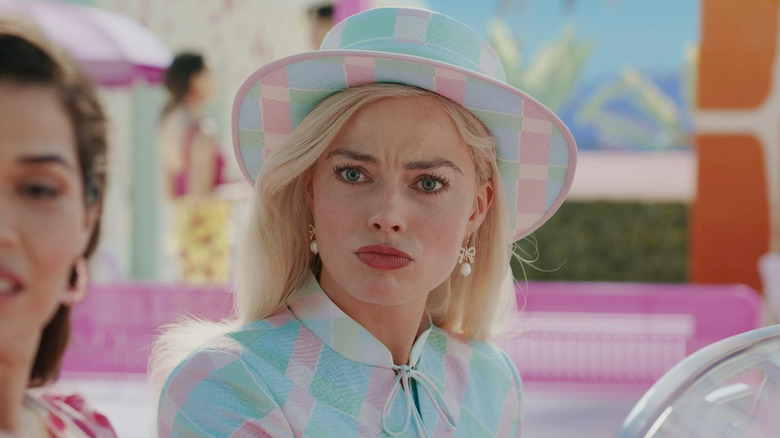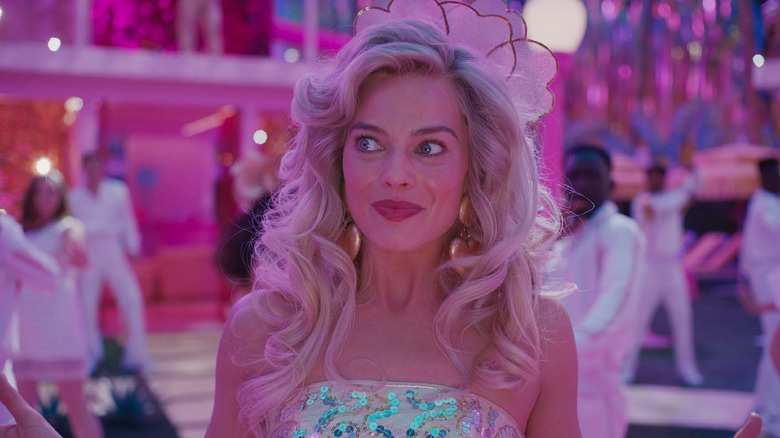One Of Barbie's Key Players Thought The Movie Was A Terrible Idea
When the news broke that Noah Baumbach and Greta Gerwig would be writing a live-action "Barbie" film for Gerwig to direct, it certainly got a lot of double-takes. The power couple behind acclaimed indie dramedies like "Frances Ha" and "Mistress America" tackling a movie based on Mattel's iconic fashion doll turned multimedia property? It was one of those ideas that sounded just wild enough to work. And boy did it ever; thanks in part to the cultural phenomenon that was Barbenheimer, Gerwig's "Barbie" film is now a billion-dollar sensation — one that even has a serious shot at scoring some love from the Academy of Motion Picture Arts and Sciences come Oscar night 2024.
If you're one of those who doubted "Barbie" could ever work as a live-action film, even with talents like Baumbach and Gerwig at the helm, you can take comfort in knowing you're not alone. In fact, no less than Baumbach himself was convinced that he and Gerwig were doomed to fail when producer/star Margot Robbie roped the couple into developing the project under her LuckyChap Entertainment banner. With the writers' strike having ended last month, that freed Baumbach up to finally talk about his experience scripting "Barbie" for the first time since its premiere following a recent special screening of the film at the Writers Guild of America West headquarters.
Speaking to Judd Apatow, who moderated the event, Baumbach explained (via Variety):
"I was just like, 'I don't see how this is going to be good at all.' I kind of blocked it for a while and every time [Gerwig would] bring it up, I'd be like, 'You've gotta get us out of this.' And then the pandemic happened [...]"
Existential dread? Now we're getting somewhere
There was one moment, in particular, from the "Barbie" trailers that left me (and undoubtedly many others) convinced this film would be something special. I'm referring to the now-famous scene where Robbie's Stereotypical Barbie, in the midst of a groovy dance party with her fellow Barbies and Kens, cheerfully asks, "Do you guys ever think about dying?" Even with little to no context, it's a great way of teeing up the film as something more profound than a glorified Mattel commercial.
Likewise, this was really the key to the whole thing for Baumbach. When Gerwig joined him and Apatow onstage for the post-screening conversation, she recalled the reasons Baumbach gave her for why they should back out of the film. "'There's no character and there's no story, so why do you want to do this? There's no entry point.' And he'd do, like, side calls to try to get us out of it," she explained. Eventually, though, she changed his mind by presenting him with some of her ideas after the pandemic began. In Baumbach's words:
"It was Barbie waking up in her Dreamhouse and coming out to her backyard and meeting somebody who was sick and dying. I read these pages and I thought, 'I understand now what this is.' [...] The movie is about embracing your mortality and about the mess of it all, so it was exciting."
While this scene as originally envisioned didn't make it into the film, the idea behind it absolutely informs Barbie's "dying" line and the film at large. It's also the genesis of Stereotypical Barbie's arc in the movie, kicking off her journey away from plastic perfection and towards embracing the flaws of humanity. Now that's the sort of story befitting of a Baumbach/Gerwig joint.

